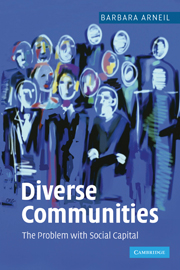Book contents
- Frontmatter
- Contents
- List of abbreviations
- Acknowledgements
- 1 Social capital, justice and diversity: an introduction
- 2 The Progressive Era: past paradise?
- 3 The present malaise in civic participation: empirical and normative dimensions
- 4 The causes of ‘decline’ in social capital theory
- 5 Civic trust and shared norms
- 6 Beyond Bowling Alone: social capital in twenty-first-century America
- 7 Justice in diverse communities: lessons for the future
- References
- Index
6 - Beyond Bowling Alone: social capital in twenty-first-century America
Published online by Cambridge University Press: 22 September 2009
- Frontmatter
- Contents
- List of abbreviations
- Acknowledgements
- 1 Social capital, justice and diversity: an introduction
- 2 The Progressive Era: past paradise?
- 3 The present malaise in civic participation: empirical and normative dimensions
- 4 The causes of ‘decline’ in social capital theory
- 5 Civic trust and shared norms
- 6 Beyond Bowling Alone: social capital in twenty-first-century America
- 7 Justice in diverse communities: lessons for the future
- References
- Index
Summary
In the years since Bowling Alone was published there have been a number of further developments that shed new light on the preceding analysis, including new research data by Robert Putnam into social capital accumulation in specific communities in America, as well as the impact of larger world events – particularly 9/11 – on the conceptualization of social capital by both academics and politicians in the United States. In 2000, after the publication of Bowling Alone, Robert Putnam and a group of academics, politicians and local community activists created the Saguaro Seminar for Civic Engagement in America, at the Kennedy School of Government at Harvard University. Its purpose was twofold: to do further, detailed, local research into the nature of the problem across the country (the Social Capital Community Benchmark surveys) and to create an advocacy movement dedicated to rebuilding social capital in local American communities. The Saguaro Seminar ultimately produced a report entitled Better Together in 2001, and a book by the same title was published in 2003. This dual focus (on research and advocacy) reflects a development in both the empirical dimension (represented by the data) and the normative dimension (represented by the advocacy) of the social capital story. Often the research results bleed into the advocacy work, and vice versa, as we shall explore. This chapter will analyse these developments as well as the ways in which President George W. Bush's domestic policies have been shaped by the idea of social capital, and most particularly by the link between the revival of American community and the Church (through the faith-based community initiatives), on the one hand, and patriotism in the wake of 9/11 (through the USA Freedom Corps), on the other.
- Type
- Chapter
- Information
- Diverse CommunitiesThe Problem with Social Capital, pp. 163 - 199Publisher: Cambridge University PressPrint publication year: 2006



